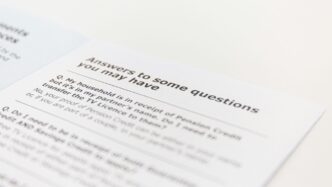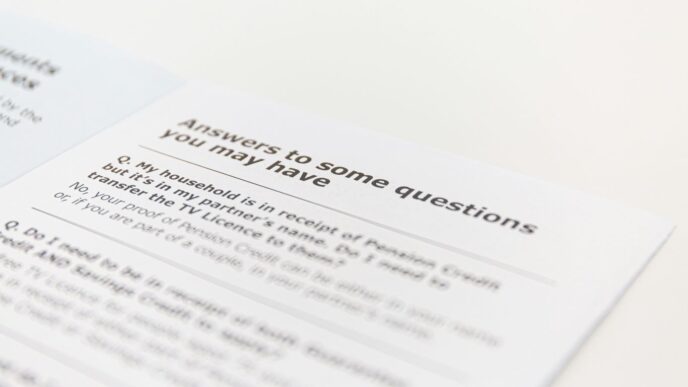Getting ready for a big job interview can be a lot. Especially when you’re looking at places like Google, where their interview process is pretty famous for being tough. It’s not just about what you know, but how you show it off. This article will help you get ready for those kinds of interviews, focusing on how the Google interview warmup can make a real difference. We’ll talk about what to expect, how to prepare, and some good ways to handle the whole thing, so you feel more ready to go.
Key Takeaways
- Google’s interview process is like a standardized test; you can study for it and get better.
- Don’t just know basic stuff; really dig into the topics and practice a lot.
- Use online tools and books, like “Cracking the Coding Interview,” to help you prepare.
- Understand the different interview types, from phone calls to hands-on tasks, and how to approach each one.
- Think of the interview as a sales pitch for yourself, and always follow up afterward.
Understanding the Google Interview Warmup Philosophy
The Standardized Test Approach
Google interviews are often talked about like they’re some kind of mystical trial, but honestly, they’re more like a standardized test. Think of it this way: you wouldn’t walk into the SATs without studying, right? The same goes for Google. Preparing shows you can buckle down and learn something new. It’s about demonstrating that you can grasp concepts and apply them under pressure. It’s not just about knowing the answers; it’s about showing you can learn and adapt. This approach has led to the rise of resources like Google Interview Warmup, which helps candidates practice and refine their skills.
Why Google’s Process Differs
Google’s interview process isn’t just about finding someone who can code; it’s about finding someone who can solve problems. Many companies focus on experience, but Google often looks for people who can push boundaries and extend domains. This is why they sometimes hire college professors or PhD candidates. They need people who can innovate, not just implement existing technologies. Regular startups need people to build products and please customers. Google’s needs are different. They’re looking for people who can think critically and creatively. This difference justifies their focus on algorithmic questions and problem-solving skills. It’s about finding someone who can use a computer, not just be a computer. It’s a sales pitch and a game to be played. You need to find everything you can about the company and their interview style.
The "Interview Anti-Loop" Phenomenon
Ever feel like you’re stuck in a loop of preparing for interviews, only to find the interviews themselves are nothing like what you prepped for? That’s the "Interview Anti-Loop." It happens when companies emulate Google’s interview style without understanding why Google does it. Small startups don’t need the same kind of talent as a company with tens of thousands of employees. This leads to a cottage industry of interview prep, with resources like "Cracking the Coding Interview" and HackerRank. Instead of focusing solely on these resources, consider what the company actually needs. Are they looking for someone to optimize code, or someone to write clean, testable code? Understanding this distinction can help you break free from the anti-loop and tailor your preparation accordingly. Here are some things to consider:
- What are the company’s core values?
- What kind of projects will you be working on?
- What technologies do they use?
Strategic Preparation for Google Interviews
Beyond Basic Knowledge
Okay, so you know the basics of data structures and algorithms. Great! But that’s just the starting point. Google interviews often go beyond textbook knowledge. You need to understand how to apply these concepts to real-world problems and be able to explain your reasoning clearly. It’s not enough to just know what to do; you need to know why you’re doing it. Think about edge cases, potential optimizations, and the trade-offs involved in different approaches. Consider this: can you explain the difference between a HashMap and a TreeMap, and when you might choose one over the other? That level of understanding is what sets you apart.
The Importance of Targeted Study
Randomly grinding LeetCode problems might help a little, but it’s not the most efficient way to prep. You need a targeted study plan. Start by identifying your weak areas. Are you rusty on dynamic programming? Do you struggle with graph algorithms? Focus your efforts on those specific areas. Break down complex topics into smaller, manageable chunks. Practice problems that are similar to the types of questions Google typically asks. And most importantly, don’t just memorize solutions. Understand the underlying principles so you can adapt to variations of the problem. Think of it like this: you’re not just learning to solve one specific puzzle; you’re learning the techniques to solve a whole class of puzzles. You can also look at phone interview strategies to help you prepare.
Leveraging Online Resources
There’s a ton of stuff online to help you get ready. But with so many options, it’s easy to get overwhelmed. Here’s a breakdown of some useful resources:
- Coding Platforms: LeetCode, HackerRank, and CodeSignal are great for practicing coding problems. Filter by topic and difficulty to focus your efforts.
- Interview Prep Sites: Glassdoor and Interview Cake provide insights into the types of questions Google has asked in the past. They also offer tips on how to approach different types of interview questions.
- YouTube Channels: There are many channels dedicated to interview prep. Some popular ones include Back to Back SWE and Clément Mihailescu. Look for videos that explain common algorithms and data structures, as well as mock interviews.
Remember, the key is to use these resources strategically. Don’t just passively consume information. Actively engage with the material by solving problems, writing code, and explaining your solutions to others. Also, consider looking at coding interview training to help you prepare.
Essential Resources for Google Interview Warmup
Cracking the Coding Interview: A Deep Dive
When it comes to getting ready for those tough coding interviews, a lot of people recommend "Cracking the Coding Interview." It’s like the go-to book for anyone wanting to work with code. It breaks down hard stuff into easy pieces.
Lots of people give it really good reviews. Even hiring managers at big companies like Google and Microsoft suggest it for people just starting out. It covers data structures, algorithms, and even gives you tips about what goes on behind the scenes during the interview process. It’s like having a secret guide to help you do well in those stressful coding challenges. You can find clear explanations, practice problems with solutions, and advice on how to talk about your ideas clearly. Check out Nucamp’s comprehensive guide for more information.
Online Platforms for Practice
Don’t forget about online resources. Sites like LeetCode, HackerRank, and AlgoExpert are great for practicing and improving your skills. They let you work through problems in a way that feels like the real thing. Some people don’t like take-home assignments, especially if they’re experienced. They’d rather just talk to someone directly. But, some people get nervous when someone is watching them. So, it’s good to have options. These platforms enhance your interview skills by providing a structured environment for coding practice.
Course-Based Learning Options
If you learn better in a class, there are options for that too. "Grokking the Coding Interview" or Udemy’s "Coding Interview Bootcamp" can help you get ready for those whiteboard sessions. These courses give you a structured way to learn and practice, which can be really helpful if you’re not sure where to start. They can help you master your next gig by providing a structured learning path.
Navigating Different Interview Formats

It’s easy to think all interviews are the same, but Google, like other tech giants, uses a few different formats. Knowing what to expect can really help calm your nerves and let you focus on showing off your skills. Let’s break down some common types.
Phone Screens and Their Pitfalls
Phone screens are usually the first step. They’re quick, often 30-45 minutes, and designed to weed out candidates who don’t meet the basic requirements. The biggest pitfall is not preparing adequately for technical questions. You might be asked about data structures, algorithms, or your experience with certain technologies. Make sure you have a quiet place to take the call and have a whiteboard or notepad handy for sketching out solutions. It’s also a good idea to have a few projects ready to discuss in detail. Don’t just list technologies; be ready to explain how you used them and what challenges you faced. Remember, it’s a two-way street. Prepare some thoughtful questions to ask the interviewer. This shows you’re engaged and genuinely interested in the role. It’s a sales pitch content creation and a game to be played.
Hands-On Assignments Versus Live Coding
Some companies use hands-on assignments as part of their interview process. These assignments give you more time to work on a problem and demonstrate your coding style, testing practices, and ability to deliver a complete solution. Live coding, on the other hand, happens in real-time, often using a shared online editor. You’ll be asked to solve a problem while the interviewer watches you code. This format tests your problem-solving skills under pressure, your ability to communicate your thought process, and your coding speed. Here’s a quick comparison:
| Feature | Hands-On Assignment | Live Coding |
|---|---|---|
| Time Allotment | Several Days | 30-60 Minutes |
| Environment | Your Own | Shared Online Editor |
| Focus | Code Quality, Design | Problem Solving, Communication |
| Pressure | Lower | Higher |
The Value of Real-World Scenarios
Google often uses real-world scenarios in its interviews. These questions are designed to assess how you would approach problems that the company actually faces. For example, you might be asked to design a system to handle a large volume of data or to optimize a particular algorithm. The key is to think critically, ask clarifying questions, and break the problem down into smaller, manageable parts. Don’t be afraid to discuss trade-offs and explain your reasoning. The interviewer is more interested in your thought process than in finding the "perfect" answer. Remember, they want to gauge your ability to problem solve and function under pressure. Here are some tips for tackling real-world scenarios:
- Understand the problem: Ask clarifying questions to make sure you fully grasp the requirements.
- Break it down: Divide the problem into smaller, more manageable sub-problems.
- Communicate your approach: Explain your thought process clearly and concisely.
- Consider trade-offs: Discuss the pros and cons of different solutions.
- Don’t be afraid to ask for help: If you’re stuck, ask the interviewer for guidance.
Success Stories and Expert Insights
Real-World Triumphs with Google Interview Warmup
It’s easy to get lost in theory, but what about actual people landing jobs? Let’s talk about some wins. Take Barbara Williams, now crushing it at Apple on their Content Delivery Network team. She credits a solid prep strategy, including resources like Cracking the Coding Interview, with helping her secure offers from multiple tech giants. It’s not just about knowing the answers; it’s about showing you can learn and adapt. Another person, Joseph Wilson, an IIT Roorkee alum and Software Engineer at Microsoft, shared his journey of acing the Google interview. He emphasized the importance of mastering data structures, algorithms, and system design, and even suggested using CodeForces to boost your skills. These stories highlight that preparation, combined with the right resources, can make a huge difference.
Insights from Industry Professionals
What do the people who conduct these interviews actually look for? It’s not always about getting the perfect answer immediately. One engineer mentioned that they’re more interested in seeing how you approach a difficult problem. Do you get frustrated? Do you shut down? Or are you resourceful and willing to learn? They want to see how your mind works. It’s about problem-solving skills and how you handle pressure. Some companies are shifting away from whiteboard problems and focusing more on real-world scenarios. They might ask you to show them a project you worked on and then implement a new feature on the spot. This approach tests your ability to apply your knowledge and learn new things quickly.
The Journey of a Microsoft Software Engineer
One software engineer shared their experience of landing a job at a startup. They went through tons of interviews that involved whiteboard problems and algorithm challenges. However, the two job offers they received were different. One company asked them to show a project, discuss future features, and implement one of those features. The other company approached them after an event and asked about their past experience and how they learn new things. Both of these interviews focused on the candidate’s ability to use their existing knowledge and learn new things quickly. The engineer emphasized that companies should strive to hire people who can pick things up quickly. For example, they didn’t know React, SVG, animation, databases, lodash, es6, or trees before starting their current job. However, they were able to learn quickly and impress their employer. Some people think that Cracking the Coding Interview isn’t enough for FAANG interviews and recommend beefier resources like the Algorithm Design Manual to master the fundamentals. Ultimately, it’s about finding what works best for you and tailoring your preparation accordingly. Here’s a quick look at some popular resources:
| Resource | Focus | Level |
|---|---|---|
| Cracking the Coding Interview | Data structures, algorithms, general prep | Beginner-Mid |
| Algorithm Design Manual | Advanced algorithms, problem-solving | Advanced |
| LeetCode | Practice problems, coding challenges | All levels |
Optimizing Your Interview Performance
So, you’ve prepped, practiced, and feel (relatively) ready. Now it’s time to think about how to actually perform well during the interview itself. It’s not just about knowing the answers; it’s about presenting yourself effectively and making a lasting impression. Let’s break down some key areas.
The Sales Pitch Mindset
Think of the interview as a sales pitch – you’re selling yourself as the solution to Google’s needs. This means highlighting your skills and experiences in a way that directly addresses the requirements of the role. Don’t just list your accomplishments; explain how they’ve made you a better engineer and how they’ll benefit Google. Quantify your achievements whenever possible. For example, instead of saying "I improved website performance," say "I reduced website load time by 20% by optimizing database queries." This gives concrete evidence of your abilities. Remember, you’re not just answering questions; you’re demonstrating value.
Pre-Interview Research Strategies
Doing your homework before the interview can give you a serious edge. This goes beyond just knowing the company’s mission statement. Dig into the specific team you’re interviewing for. What projects are they working on? What technologies are they using? Look up your interviewers on LinkedIn. What are their backgrounds? What are their areas of expertise? This research allows you to tailor your answers and ask intelligent questions. It shows that you’re genuinely interested in the role and that you’ve taken the time to understand the company’s needs. Understanding AI for growth can also help you tailor your responses to show you’re forward-thinking.
Post-Interview Follow-Up Best Practices
Don’t underestimate the power of a well-crafted follow-up email. Send a thank-you note to each of your interviewers within 24 hours of the interview. Reiterate your interest in the role and briefly mention something specific that you discussed with each interviewer. This shows that you were engaged in the conversation and that you value their time. If you forgot to mention something important during the interview, you can use the follow-up email to add it. For example, "I also wanted to mention my experience with X technology, which I believe would be relevant to this role." A thoughtful follow-up can solidify your candidacy and leave a positive lasting impression. It’s a simple step that can make a big difference. It’s also a good idea to connect with your interviewers on LinkedIn – it’s a great way to stay in touch and build your network. Remember to personalize your connection request with a brief note referencing your interview. This shows that you’re not just adding them to your network randomly, but that you genuinely value their connection.
Addressing Common Interview Challenges
Overcoming Interview Stress
Okay, let’s be real, Google interviews are stressful. It’s easy to get caught up in the pressure and let your nerves get the best of you. One thing that helps is to reframe the situation. Instead of seeing it as a test you have to pass, try viewing it as a conversation with another engineer. They want to see how you think, not just if you know the answer. Practice some mindfulness techniques before the interview, like deep breathing or visualization. It sounds cheesy, but it can actually calm your nerves. Also, remember to get enough sleep the night before! A tired brain is not your friend in this situation.
Handling Unexpected Questions
So, you’ve prepped for all the common data structures and algorithms, and then BAM! The interviewer throws you a curveball question you’ve never seen before. What do you do? Don’t panic! It’s okay to say, "That’s an interesting question. Let me think about it for a minute." Then, start by clarifying the question and breaking it down into smaller parts. Talk through your thought process out loud. Even if you don’t arrive at the perfect solution, demonstrating your problem-solving approach is what matters most. Interviewers want to see how you tackle unfamiliar problems, not just if you know all the answers. It’s also perfectly acceptable to ask clarifying questions to better understand the problem.
Demonstrating Problem-Solving Skills
Google isn’t just looking for coders; they’re looking for problem solvers. You might know all the algorithms, but can you apply them creatively to new situations? When you’re presented with a problem, don’t just jump into coding. Take a step back and analyze the problem. Consider different approaches and their trade-offs. Explain your reasoning to the interviewer. Why are you choosing one approach over another? What are the potential bottlenecks? The ability to articulate your thought process is key. Remember, it’s not always about getting the right answer; it’s about showing how you think. If you get stuck, don’t be afraid to ask for help or bounce ideas off the interviewer. They’re there to guide you, not just to judge you. Here’s a simple breakdown of a good approach:
- Understand the problem fully.
- Outline a potential solution.
- Explain your reasoning.
- Write clean, testable code.
Conclusion
So, that’s the scoop on getting ready for those Google interviews. It’s not just about knowing your stuff, it’s also about playing the game a little. You’ve got to practice, sure, but also understand what they’re really looking for. It can feel like a lot, especially with all the talk about how hard these interviews are. But honestly, with the right kind of practice, like using tools that mimic the real thing, you can totally get yourself ready. It’s about being smart with your prep, not just studying everything under the sun. Good luck out there!
Frequently Asked Questions
Why are Google interviews so different from other job interviews?
Google’s interviews are like a big test. They want to see if you can learn new things and solve problems. It’s not always about what you already know, but how you think.
What’s the best way to get ready for a Google interview?
You should study more than just basic facts. Focus on the kinds of problems Google asks. There are lots of websites and books that can help you practice.
Are there any good books or websites to help me prepare?
Many people find “Cracking the Coding Interview” very helpful. Websites like LeetCode and HackerRank are also great for practicing coding problems. Some online courses can also teach you what you need to know.
What kind of interview tests should I expect?
Sometimes you’ll have a quick phone call, other times you’ll do a coding test on a computer, or even work on a project. It’s good to be ready for all these different ways of testing.
How can I do my best during the interview?
It’s like selling yourself! Show them you’re excited about the job. Do some homework on the company before you talk to them. And always send a thank you note after the interview.
What if I get nervous or don’t know an answer?
It’s normal to feel nervous. Try to stay calm. If you get a tough question, don’t panic. Just show them how you try to figure out the answer, even if you don’t know it right away.














